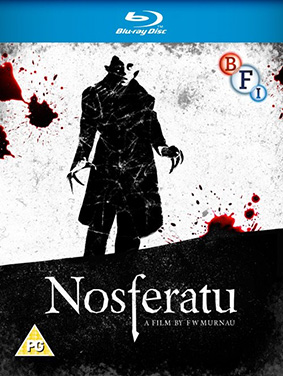F W Murnau's 1922 horror classic Nosferatu: A Symphony of Horrors [Nosferatu: Eine symphonie des grauens] was the first screen adaption of Bram Stoker's Dracula. Now newly remastered and accompanied by James Bernard’s acclaimed orchestral score, it will be released on Blu-ray by the BFI in November.
Special features include a video essay by Christopher Frayling and the short films Le Vampire by French filmmaker Jean Painlevé and The Mistletoe Bough by early film pioneer Percy Stow, which features a new score by Saint Etienne’s Pete Wiggs.
As potent and disturbing now as ever, Nosferatu paved the way for the future of gothic cinema. Max Schreck’s Count Orlok, bald, bat-eared and rabbit toothed, is at once terrifying and pitiable, his need for blood, for living warmth is palpable to the point of agony. Featuring some of the most iconic images in cinema, Murnau's interpretation of this great vampire tale has been much imitated not least by Werner Herzog, whose Nosferatu the Vampyre is an admiring tribute.

Nosferatu: A Symphony of Horrors will be reelased on UK Blu-ray by the BFI, newly restored and remastered, on 23rd November 2015 at the RRP of £19.99.
Special features:
-
Christopher Frayling on Nosferatu (Lynne Wake, 2001, 24 mins): video essay on Nosferatu and F W Murnau and Albin Grau’s backgrounds and influences
-
Le Vampire (Jean Painlevé, 1945, 9 mins): Painlevé's study of the South American vampire bat, an allegory for the Nazism that was sweeping throughout Europe at the time
-
The Mistletoe Bough (Percy Stow, 1904, 8 mins): the oldest film version of a classic Christmas ghost story restored by the BFI, featuring a new score by Saint Etienne's Pete Wiggs
-
Image Gallery, featuring some of Albin Grau's original production drawings, stills and designs for publicity materials
-
Fully illustrated booklet featuring film credits, film notes by David Kalat and an essay on Albin Grau and Nosferatu’s occultist origins by Brian J Robb
|